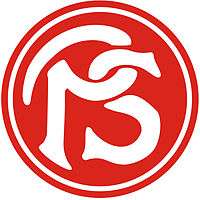Socialist Party (Argentina)
| Socialist Party Partido Socialista | |
|---|---|
 | |
| Leader | Hermes Binner |
| Founded | 28 June 1896 |
| Headquarters | Buenos Aires, Argentina |
| Membership (2012) | 124,934 (4th)[1] |
| Ideology |
Social democracy Democratic socialism |
| Political position | Centre-left |
| National affiliation | Progresistas |
| International affiliation |
Progressive Alliance, Socialist International |
| Colors | Red |
| Seats in the Chamber of Deputies |
7 / 257 |
| Seats in the Senate |
1 / 72 |
| Province Governors |
1 / 24 |
| Website | |
| http://www.partidosocialista.org.ar/ | |
|
Politics of Argentina Political parties Elections | |
The Socialist Party (Spanish: Partido Socialista, PS) is a social-democratic political party in Argentina.[2][3]
Organizational history
The history of socialism in Argentina began in the 1890s, when a group of people, notably Juan B. Justo, expressed the need for a greater social focus. The PS itself was founded in 1896, led by Justo and Nicolás Repetto, thus becoming the first mass party in the country. The party affiliated itself with the Second International.[4] Between 1924 and 1940 it was a member of the Labour and Socialist International.[5]
Through its life, the party suffered from various splits: the International Socialist Party, (which became the Communist Party of Argentina) and the Independent Socialist Party were the most notable. The most important of those was in the 1960s, when the party divided itself in half, giving birth to the more radical Argentine Socialist Party (Partido Socialista Argentino, PSA), and the more moderate Democratic Socialist Party (Partido Socialista Democrático, PSD). In 1966, two factions departed the PSA: Vanguardia Comunista and Partido Socialista de Vanguardia. In 1972, the remaining of the PSA together with other leftist groups formed the Popular Socialist Party (Partido Socialista Popular, PSP). The PSP and PSD were rejoined in 2002, forming the Socialist Party.
Among the socialist leaders of Argentina, the most remarkable are Alfredo Palacios, who was the first socialist parliamentarian in the Americas (1904) and a Senator in the 1960s; Juan B. Justo, doctor, philosopher, writer and leader of the party until his death in 1928; Alicia Moreau de Justo, (1895–1986), Justo's wife, who was for years the editor of the Socialist newspaper La Vanguardia; Guillermo Estévez Boero, founder of the Popular Socialist Party; and Alfredo Bravo, a teacher, unionist, human rights militant and respected legislator in the last two decades of the 20th century (died 2003).
The Socialist Party of Argentina maintains an electoral stronghold in the province of Santa Fe, and particularly in Rosario, where mayors have been socialists since 1989. Former two-term mayor Hermes Binner slowly became acknowledged as a reference character for the party. In the 2005 parliamentary elections a Socialist-Radical alliance led by Binner won 5 seats in the national Lower House, and in the elections of 2007 Binner, leading a broad, centre-leftist political coalition (the Progressive, Civic and Social Front), became the first Socialist to be elected governor of an Argentine province.[6]
In the 2011 General Elections, Binner was the Socialist candidate and achieved 2nd place with 16.8% of votes.[7] Despite this number being well below the 54.1% achieved by Peronist leader Cristina Fernández de Kirchner, the Socialist Party considered the results of the election as significant and a sign of renewed interest by a sector of the population.[8] In May 2012, Binner became the Socialist Party's president.[9]
Footnotes
- ↑ Estadística de Afiliados, Primer Semestre 2012, Registro Nacional de Afiliados a los Partidos Políticos, Cámara Nacional Electoral.
- ↑ Official web site.
- ↑ Political parties of Argentina (in Spanish) - A list of Argentina's registered political parties, at the Ministry of Interior's website.
- ↑ Rubio, José Luis. Las internacionales obreras en América. Madrid: 1971. p. 49
- ↑ Kowalski, Werner. Geschichte der sozialistischen arbeiter-internationale: 1923 - 19. Berlin: Dt. Verl. d. Wissenschaften, 1985. p. 286
- ↑ La Capital, 3 September 2007. Un socialista en el sillón de la Casa Gris.
- ↑ Argentine general election, 2011
- ↑ http://www.hermesbinner.com.ar/noticias/un-balance-necesario/
- ↑ Binner asumió la presidencia del Partido Socialista, Página/12, 2012-05-09
Further reading
- Jeremy Adelman, "Socialism and Democracy in Argentina in the Age of the Second International," Hispanic American Historical Review, vol. 72, no. 2 (May 1992), pp. 211-238. In JSTOR.